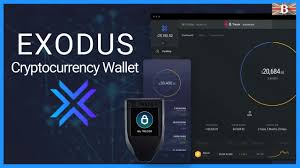
Exodus Wallet: A Comprehensive Guide to the Popular Crypto Wallet
As cryptocurrency adoption grows, the need for secure and user-exodus wallets becomes more important than ever. One of the most popular options among crypto enthusiasts is Exodus Wallet—a sleek, multi-currency wallet that combines security, functionality, and ease of use. Whether you’re a beginner looking for a simple way to store your digital assets or an experienced trader seeking advanced features, Exodus offers a well-rounded solution.
In this article, we’ll explore what makes Exodus Wallet stand out, its key features, security aspects, and how it compares to other crypto wallets.
What Is Exodus Wallet?
Exodus Wallet is a non-custodial cryptocurrency wallet that allows users to store, send, receive, and exchange digital assets. Launched in 2015 by JP Richardson and Daniel Castagnoli, Exodus was designed to make cryptocurrency management as simple and intuitive as possible.
Unlike many other wallets that cater to highly technical users, Exodus prioritizes a clean, user-friendly interface, making it a popular choice for beginners while still offering advanced features for seasoned investors.
Exodus is available as a desktop, mobile, and browser extension wallet, supporting multiple operating systems, including Windows, macOS, Linux, iOS, and Android.
Key Features of Exodus Wallet
1. Multi-Currency Support
Exodus supports over 300 cryptocurrencies, including Bitcoin (BTC), Ethereum (ETH), Cardano (ADA), Solana (SOL), Dogecoin (DOGE), and many ERC-20 and Solana-based tokens. This makes it a versatile wallet for users who hold a diverse portfolio.
2. Built-in Exchange
One of the standout features of Exodus is its built-in exchange, allowing users to swap one cryptocurrency for another directly within the wallet. This eliminates the need for external exchanges and makes trading more convenient.
3. Non-Custodial Security
Since Exodus is a non-custodial wallet, users have full control over their private keys and funds. This means that no third party, including Exodus itself, has access to your assets, making it a more secure option compared to custodial wallets.
4. Portfolio Tracking
Exodus provides real-time tracking of your crypto holdings, including portfolio charts, price updates, and historical data. This feature makes it easy for users to monitor their investments without needing to check external sites.
5. Hardware Wallet Integration
For added security, Exodus integrates with Trezor hardware wallets (Trezor Model T and Trezor One). This allows users to store their private keys offline while still managing their assets through the Exodus interface.
6. NFT Support
Exodus has expanded its capabilities to support NFTs (non-fungible tokens) on Ethereum and Solana. Users can store, send, and view their NFT collections directly in the wallet.
7. Staking Rewards
Exodus allows users to stake certain cryptocurrencies, including Cardano (ADA), Solana (SOL), Tezos (XTZ), and Algorand (ALGO), earning passive rewards while holding their coins.
8. 24/7 Customer Support
Unlike many other crypto wallets that rely solely on community forums, Exodus provides 24/7 customer support, making it an attractive choice for those who value quick assistance.
Security: Is Exodus Wallet Safe?
Security is a major concern for any cryptocurrency user, and while Exodus offers a range of safety features, it’s important to understand its limitations.
Pros of Exodus Security:
✔ Private Keys: Users control their private keys, ensuring complete ownership of their funds.
✔ No Personal Data Required: Exodus does not require personal information or KYC verification, enhancing privacy.
✔ Hardware Wallet Integration: Support for Trezor provides an additional layer of protection.
✔ Biometric Authentication: On mobile, users can enable fingerprint or face ID for added security.
Cons of Exodus Security:
❌ No Two-Factor Authentication (2FA): Unlike some other wallets, Exodus does not support 2FA, which could enhance security.
❌ Hot Wallet Vulnerabilities: Since Exodus is an online (hot) wallet, it is still susceptible to malware, phishing attacks, and hacks if the user’s device is compromised.
❌ Not Open-Source (Fully): While some parts of Exodus are open-source, the full wallet software is not, meaning security audits depend on the Exodus team.
For users who prioritize maximum security, pairing Exodus with a hardware wallet (like Trezor) is highly recommended.
